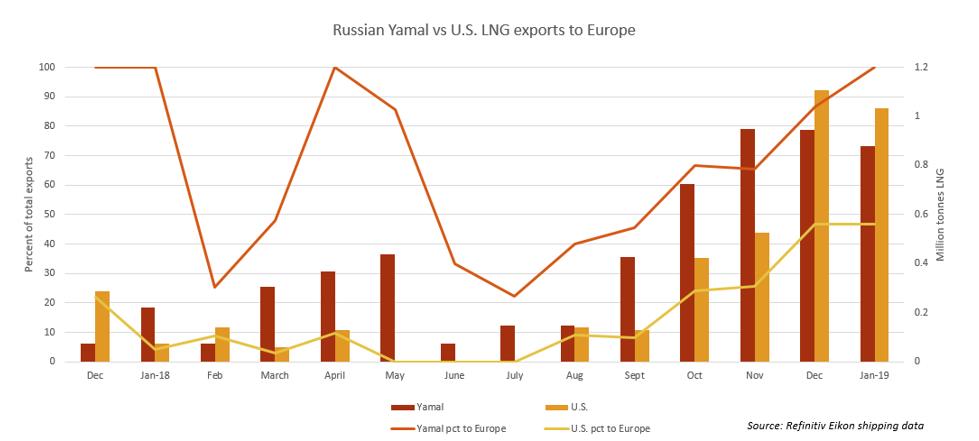A media and sanction war over the European energy market continues.
Royal Dutch Shell pulled out of the Baltic Coast LNG project with Gazprom, because the Russian company suddenly added another partner who is under US sanctions, Reuters reported.
“Following Gazprom’s announcement on March 29 regarding the final development concept of Baltic LNG, we have decided to stop our involvement in this project. We have a number of other ongoing projects with Gazprom, including as part of the Strategic Alliance established between the two companies in 2015, which are not impacted by this decision,” Cederic Cremers said as quoted by the company’s press service.
According to five anonymous sources, cited by Reuters, however, the reason was because Gazprom introduced the company RusGazDobycha, without consulting Shell.
RusGazDobycha is 100 percent-owned by a firm called National Gas Group (NGG), according to the Spark database, which collates official data from the tax agency and the state statistics agency.
Until November 2016, Rotenberg had a 51 percent stake in NGG, the database shows. The majority owner of NGG now is Artyom Obolensky, who is also chairman of the board of SMP Bank, controlled by Arkady Rotenberg and his brother Boris.
Arkady Rotenberg is known as “Putin’s Judo partner” and is sanctioned by the US in March 2014.
A representative of Arkady Rotenberg, asked about the Baltic LNG project, said Rotenberg “has no interests in this business.”
According to the sources, Shell didn’t feel comfortable with the new partner configuration and it became untenable for Shell to stay in the project “and that was clear from the moment that Gazprom announced it was going to build the plant together with RusGazDobycha,” a source claimed.
Partnering with a Rotenberg-linked firm was equal to “digging yourself your own sanctions grave,” said the anonymous source.
Shell said that its other joint projects in Russia — chief among them the Gazprom-led Sakhalin-2 LNG plant — would be unaffected by its exit from the Baltic LNG project.
Reuters also alleged that this is yet another example of the dangers of doing business with and in Russia.
“The sudden shift in the project underlines the unpredictability of doing business in Russia — even for a firm like Shell with a long pedigree of successful cooperation. It also shows how Rotenberg’s business empire, focused mainly on construction and engineering, is expanding into the energy sector.”
Separately, Reuters also reported, citing anonymous sources, that Gazprom would rely on industrial gases group Linde to replace Shell in the project.
“The choice is clear now because Shell has left the project and declined to provide its technology,” the source said.
Linde’s technology is the only option available for the project, the source added.
Neither Gazprom nor Linde have provided any comment on the matter.
It should be noted that until recently, and over-all Russia is the largest supplier of LNG to Europe, not simply natural gas.
The graphic shows that in the winter months the US appears to pick up and also even get ahead of sales, but throughout every other month of the year Russia is clearly ahead of sales to Europe.
In terms of Russian-European projects, the Nord Stream 2 announced that it 1,000 km of the gas pipeline across the Baltic seafloor through Finnish, Swedish and German waters was laid down. So, the project is going full-steam despite US opposition, a long with some EU member states.
On April 10th, US Secretary of State Mike Pompeo also commented on the Nord Stream 2 saying that Germany wouldn’t be discouraged from it.
“The Germans appear intent on continuing to build that pipeline… We had done just about all we can to discourage the Europeans, primarily Germans, from building Nord Stream 2 and we’ve done that without success today,” Pompeo said.
There was, however, a setback – Denmark delayed its approval for building the segment of the pipeline that crosses its territorial waters.
Responding to some media reports that Copenhagen had allegedly called a complete halt to the Nord Stream 2 pipeline project, a spokesman of the Danish Energy Agency told EURACTIV that the DEA has merely “requested” the company to “investigate the environmental impacts for a route south of Bornholm in the continental shelf area.”
“When the Nord Stream 2 company provides the Danish authorities with an environmental impact assessment, it has to go through the normal procedure with public hearings etc,” the spokesman said, adding that a decision from the agency will depend on this process.
Nord Stream 2 AG, in a statement to EURACTIV, confirmed that the Danish Energy Agency didn’t reject either of the two pending permit applications and that both remain valid.
“Nord Stream 2 will now carefully evaluate the request from the DEA and then decide what steps should be taken next,” the statement added.
“The DEA has requested Nord Stream 2 to include a route option in the Danish exclusive economic zone to the south of Bornholm into the environmental assessment,” the Nord Steam 2 company told EURACTIV.
So, even in this cause, the project was not jeopardized.
In the coming month, the Washington establishment, its diplomatic allies and pro-establishment media outlets will continue blame and shame the Nord Stream 2 project and other Russian activities in the European energy market. The key problem of this campaign is that if any European economy with more or less powerful industry supports this initiative, it will be predetermined to bore significant costs and economic loses because of such a “diplomatic stance” in support of Washington’s own plans for the European market.







